Spotlight on ‘Raisin in the Sun’ actor Rose Thomas and her character Beneatha
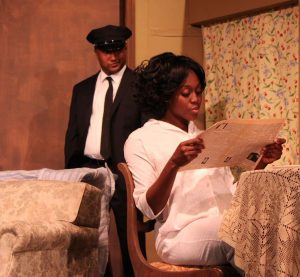 On stage in the Foulds Theatre at the Alliance for the Arts is Theatre Conspiracy’s production of Lorraine Hansberry’s timeless classic, A Raisin in the Sun. Playing the part of Beneatha Younger is Rose Thomas.
On stage in the Foulds Theatre at the Alliance for the Arts is Theatre Conspiracy’s production of Lorraine Hansberry’s timeless classic, A Raisin in the Sun. Playing the part of Beneatha Younger is Rose Thomas.
In a play filled with unique, ripped-from-life personalities, Beneatha Younger is truly one of the more fascinating characters in A Raisin in the Sun. Although the play explores the interplay between poverty, unfulfilled dreams and (to a lesser extent) racism and social injustice, through the 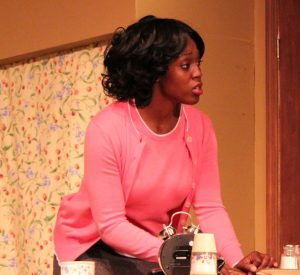 character of Beneatha Younger, Hansberry anticipates the issues of feminism. Remarkably, she did so some four years before Betty Friedan published her bestselling book The Feminine Mystique, which argued that the conventional image of women as homemakers limited their possibilities and wasted their talent and potential. [As a matter of context, A Raisin in the Sun pre-dated the Equal Pay Act of 1963, Title VII of the Civil Rights Act of 1964 (which banned sex discrimination in employment)
character of Beneatha Younger, Hansberry anticipates the issues of feminism. Remarkably, she did so some four years before Betty Friedan published her bestselling book The Feminine Mystique, which argued that the conventional image of women as homemakers limited their possibilities and wasted their talent and potential. [As a matter of context, A Raisin in the Sun pre-dated the Equal Pay Act of 1963, Title VII of the Civil Rights Act of 1964 (which banned sex discrimination in employment) 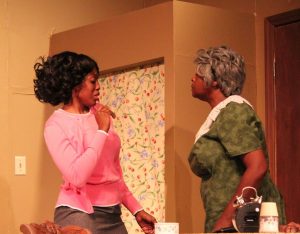 and Griswold v. Connecticut Supreme Court (which legalized birth control for married couples in 1965).]
and Griswold v. Connecticut Supreme Court (which legalized birth control for married couples in 1965).]
First and foremost, Beneatha is on a trajectory to go to medical school and become a doctor at a time when young women primarily went to college in order to find a well-educated husband who would provide for her and 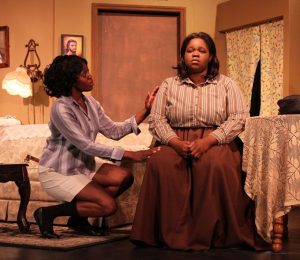 the family they would raise together. George Murchison (played by Peter Lange) is just such a man. He is smart, comes from a wealthy family (“he’s rich and he knows he’s rich”), and is looking for a beautiful, well-educated wife. While her brother and even her sister-in-law struggle to understand why Beneatha isn’t falling all over herself to land such a great catch, her mother gets that in dismissing George, her daughter is really refusing to play the role of supportive, submissive homemaker that
the family they would raise together. George Murchison (played by Peter Lange) is just such a man. He is smart, comes from a wealthy family (“he’s rich and he knows he’s rich”), and is looking for a beautiful, well-educated wife. While her brother and even her sister-in-law struggle to understand why Beneatha isn’t falling all over herself to land such a great catch, her mother gets that in dismissing George, her daughter is really refusing to play the role of supportive, submissive homemaker that 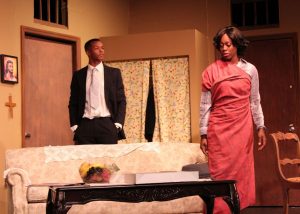 young Murchison would demand.
young Murchison would demand.
Joseph Asagai (played by Kenneth Jones) also wants to supplant Beneatha’s dream with one of his own, but he nonetheless appeals to her for one important reason. Throughout the play, Beneatha is in search of identity. Her sister-in-law ridicules her for squandering the family’s hard-earned money on such frivolities as horseback riding, 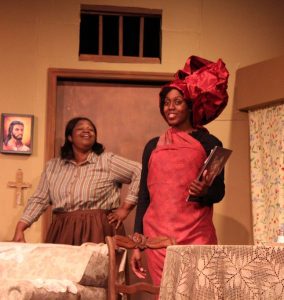 photography, acting lessons and learning to play the guitar. But it’s not merely a matter of selfishness or ego-centricity that causes her to flit from one pursuit to another, but her all-consuming quest for identity. Beneatha Younger is a woman who is tenaciously trying to discover who she really is.
photography, acting lessons and learning to play the guitar. But it’s not merely a matter of selfishness or ego-centricity that causes her to flit from one pursuit to another, but her all-consuming quest for identity. Beneatha Younger is a woman who is tenaciously trying to discover who she really is.
Asagai understands this about her. He calls her “Alaiyo,” which translates to “One for Whom Bread – Food – is Not Enough.” Novel ideas are the things that feed her soul. Independent thinking excites her from head to heels. And so he urges 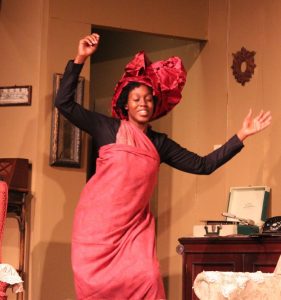 Beneatha to embrace her African roots. Following his advice, she lets her hair go natural, dances to the African music he provides and dons the Nigerian robes he brings her.
Beneatha to embrace her African roots. Following his advice, she lets her hair go natural, dances to the African music he provides and dons the Nigerian robes he brings her.
He also proposes that she go with him to Africa where, he assures her, “you’ll feel as though you’ve been away for only one day” even though neither she nor her family has ever been out of their South Side Chicago neighborhood. The offer comes with a marriage proposal and, somewhat incongruously, she considers accepting the offer after her brother loses the money that would have paid for her to go 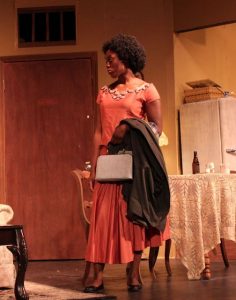 to medical school. Will her desire for independence prevail or will she accompany the charismatic Nigerian to his homeland and become a doctor there? As with other issues raised by the storyline, Hansberry leaves the resolution of this question to the imagination of the people who see or read the play.
to medical school. Will her desire for independence prevail or will she accompany the charismatic Nigerian to his homeland and become a doctor there? As with other issues raised by the storyline, Hansberry leaves the resolution of this question to the imagination of the people who see or read the play.
Although a relative newcomer to theater, Thomas channels these complex, layered motives and character traits in reflecting the conflict that her desires and education create between Beneatha and her family. One such exchange takes place early in the play, when Beneatha earns a slap across the face for spouting ideas 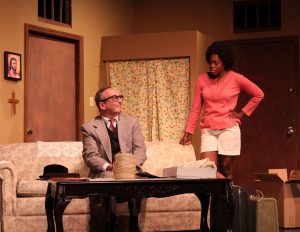 antithetical to her mother’s views on God and religion.
antithetical to her mother’s views on God and religion.
“Mama, you don’t understand. It’s all a matter of ideas, and God is just one idea I don’t accept. It’s not important. I am not going out and commit crimes or be immoral because I don’t believe in God. I don’t even think about it. It’s just that I get so tired of Him getting credit for all the things the human race achieves 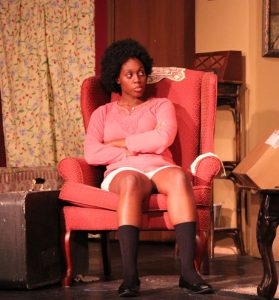 through its own stubborn effort. There simply is no God! There is only Man, and it’s he who makes miracles!”
through its own stubborn effort. There simply is no God! There is only Man, and it’s he who makes miracles!”
But underlying her intellectual atheism, Beneatha nonetheless aspires to be God-like.
“I always thought it was the one concrete thing in the world that a human being could do – fix up the sick, you know – and make them whole again. This was truly being God…I wanted to cure. It used to be so important to me. I wanted to cure. It used to matter. I used to care. I mean about people and how their bodies hurt…
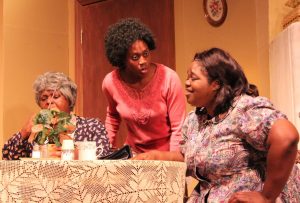 Thomas gets this and so much more about her character. Part of that, admittedly, is good direction from Sonya McCarter. But part of this inheres in Thomas’ talent for acting and character development. A Raisin in the Sun is just Thomas’ third play and only her second biggest role. But she learned a lot about her craft from mimicking the actors and getting into the characters they played on television
Thomas gets this and so much more about her character. Part of that, admittedly, is good direction from Sonya McCarter. But part of this inheres in Thomas’ talent for acting and character development. A Raisin in the Sun is just Thomas’ third play and only her second biggest role. But she learned a lot about her craft from mimicking the actors and getting into the characters they played on television 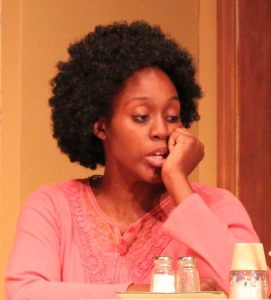 and in the movies. That being the case, there’s no limit to how good she can get as she tackles more and even bigger roles.
and in the movies. That being the case, there’s no limit to how good she can get as she tackles more and even bigger roles.
Just 23, Thomas has two beautiful children and currently owns her own online boutique called Hautesista.com. When she’s not working, she enjoys spending time with the kiddos and doing photoshoots. She believes that nothing in life comes easy and is willing to work hard to get it, so why not make it a movie! Meanwhile what Thomas is making is a believable portrayal of a complex, avant garde character in the guise of Beneatha Younger.
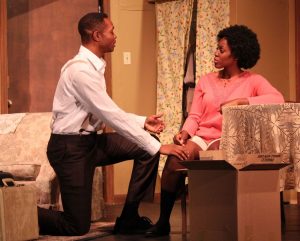 May 6, 2018.
May 6, 2018.
RELATED POSTS.
- ‘A Raisin in the Sun’ considered one of 20th Century’s greatest plays
- ‘Raisin in the Sun’ a race relations conversation starter
- Without role models, mentors and sponsors, dreams shrivel like ‘A Raisin in the Sun’
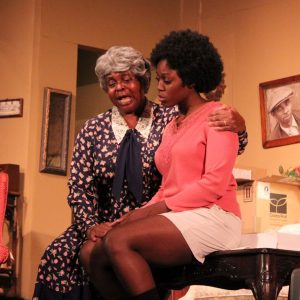 ‘Raisin in the Sun’ actor Patricia Idlette in the spotlight
‘Raisin in the Sun’ actor Patricia Idlette in the spotlight- ‘A Raisin in the Sun’ actor Cantrella Canady in the spotlight
- Spotlight on ‘Raisin in the Sun’ actor Keehnon Jackson
- Spotlight on ‘Raisin in the Sun’ actor Kenneth Jones
- ‘A Raisin in the Sun’ actor James Robinson in the spotlight
- ‘A Raisin in the Sun’ actor Sandra Dixon in the spotlight
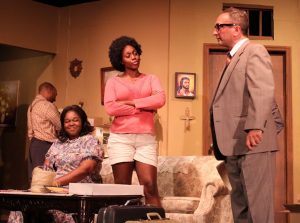 ‘A Raisin in the Sun’ play dates, times and ticket info
‘A Raisin in the Sun’ play dates, times and ticket info- Community talk-backs to follow two ‘Raisin in the Sun’ performances
- ‘A Raisin in the Sun’ director Sonya McCarter in the spotlight














 Tom Hall is both an amateur artist and aspiring novelist who writes art quest thrillers. He is in the final stages of completing his debut novel titled "Art Detective," a story that fictionalizes the discovery of the fabled billion-dollar Impressionist collection of Parisian art dealer Josse Bernheim-Jeune, thought by many to have perished during World War II when the collection's hiding place, Castle de Rastignac in southern France, was destroyed by the Wehrmacht in reprisal for attacks made by members of the Resistance operating in the area. A former tax attorney, Tom holds a bachelor's degree as well as both a juris doctorate and masters of laws in taxation from the University of Florida. Tom lives in Estero, Florida with his fiancee, Connie, and their four cats.
Tom Hall is both an amateur artist and aspiring novelist who writes art quest thrillers. He is in the final stages of completing his debut novel titled "Art Detective," a story that fictionalizes the discovery of the fabled billion-dollar Impressionist collection of Parisian art dealer Josse Bernheim-Jeune, thought by many to have perished during World War II when the collection's hiding place, Castle de Rastignac in southern France, was destroyed by the Wehrmacht in reprisal for attacks made by members of the Resistance operating in the area. A former tax attorney, Tom holds a bachelor's degree as well as both a juris doctorate and masters of laws in taxation from the University of Florida. Tom lives in Estero, Florida with his fiancee, Connie, and their four cats.